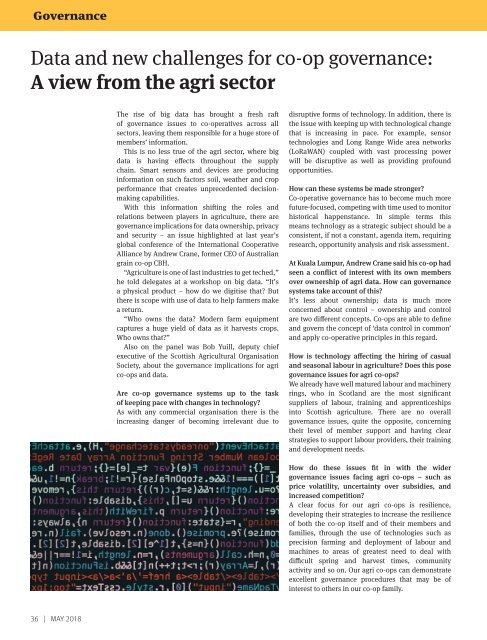MAY 2018
The May 2018 edition of Co-op News: connecting, challenging and championing the global co-operative movement. This issue shines a spotlight on governance – and how co-operatives do it differently. We also look at co-ops on the agenda in Westminster, sustainability supporting and preview some of the motions being put to the vote at the Co-op Group AGM.
The May 2018 edition of Co-op News: connecting, challenging and championing the global co-operative movement. This issue shines a spotlight on governance – and how co-operatives do it differently. We also look at co-ops on the agenda in Westminster, sustainability supporting and preview some of the motions being put to the vote at the Co-op Group AGM.
You also want an ePaper? Increase the reach of your titles
YUMPU automatically turns print PDFs into web optimized ePapers that Google loves.
Data and new challenges for co-op governance:<br />
A view from the agri sector<br />
The rise of big data has brought a fresh raft<br />
of governance issues to co-operatives across all<br />
sectors, leaving them responsible for a huge store of<br />
members’ information.<br />
This is no less true of the agri sector, where big<br />
data is having effects throughout the supply<br />
chain. Smart sensors and devices are producing<br />
information on such factors soil, weather and crop<br />
performance that creates unprecedented decisionmaking<br />
capabilities.<br />
With this information shifting the roles and<br />
relations between players in agriculture, there are<br />
governance implications for data ownership, privacy<br />
and security – an issue highlighted at last year’s<br />
global conference of the International Cooperative<br />
Alliance by Andrew Crane, former CEO of Australian<br />
grain co-op CBH.<br />
“Agriculture is one of last industries to get teched,”<br />
he told delegates at a workshop on big data. “It’s<br />
a physical product – how do we digitise that? But<br />
there is scope with use of data to help farmers make<br />
a return.<br />
“Who owns the data? Modern farm equipment<br />
captures a huge yield of data as it harvests crops.<br />
Who owns that?”<br />
Also on the panel was Bob Yuill, deputy chief<br />
executive of the Scottish Agricultural Organisation<br />
Society, about the governance implications for agri<br />
co-ops and data.<br />
Are co-op governance systems up to the task<br />
of keeping pace with changes in technology?<br />
As with any commercial organisation there is the<br />
increasing danger of becoming irrelevant due to<br />
disruptive forms of technology. In addition, there is<br />
the issue with keeping up with technological change<br />
that is increasing in pace. For example, sensor<br />
technologies and Long Range Wide area networks<br />
(LoRaWAN) coupled with vast processing power<br />
will be disruptive as well as providing profound<br />
opportunities.<br />
How can these systems be made stronger?<br />
Co-operative governance has to become much more<br />
future-focused, competing with time used to monitor<br />
historical happenstance. In simple terms this<br />
means technology as a strategic subject should be a<br />
consistent, if not a constant, agenda item, requiring<br />
research, opportunity analysis and risk assessment.<br />
At Kuala Lumpur, Andrew Crane said his co-op had<br />
seen a conflict of interest with its own members<br />
over ownership of agri data. How can governance<br />
systems take account of this?<br />
It’s less about ownership; data is much more<br />
concerned about control – ownership and control<br />
are two different concepts. Co-ops are able to define<br />
and govern the concept of ‘data control in common’<br />
and apply co-operative principles in this regard.<br />
How is technology affecting the hiring of casual<br />
and seasonal labour in agriculture? Does this pose<br />
governance issues for agri co-ops?<br />
We already have well matured labour and machinery<br />
rings, who in Scotland are the most significant<br />
suppliers of labour, training and apprenticeships<br />
into Scottish agriculture. There are no overall<br />
governance issues, quite the opposite, concerning<br />
their level of member support and having clear<br />
strategies to support labour providers, their training<br />
and development needs.<br />
How do these issues fit in with the wider<br />
governance issues facing agri co-ops – such as<br />
price volatility, uncertainty over subsidies, and<br />
increased competition?<br />
A clear focus for our agri co-ops is resilience,<br />
developing their strategies to increase the resilience<br />
of both the co-op itself and of their members and<br />
families, through the use of technologies such as<br />
precision farming and deployment of labour and<br />
machines to areas of greatest need to deal with<br />
difficult spring and harvest times, community<br />
activity and so on. Our agri co-ops can demonstrate<br />
excellent governance procedures that may be of<br />
interest to others in our co-op family.<br />
36 | <strong>MAY</strong> <strong>2018</strong>


















